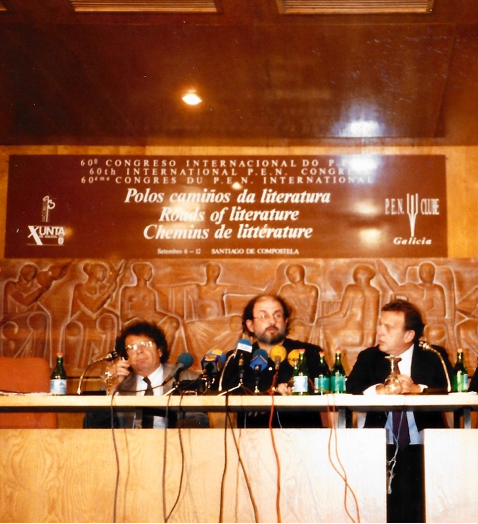Bridges Through Literature
In the early years of this century—2004-2007—I was elected the International Secretary of PEN International, a position at the time responsible for overseeing the running of the day-to-day operations of the global organization, along with a small staff. (During my term we hired the first paid executive director.) PEN’s international organization includes four standing committees—the Peace Committee, the Writers in Prison Committee, the Translation and Linguistic Rights Committee and the Women Writers Committee.
Because I’d been Chair of the Writers in Prison Committee, which oversees the human rights activities of PEN and takes action in defense of writers in prison and at risk around the world, I understood this committee’s work and mandate. I understood the work and mandate of the Translation and Linguistic Rights Committee to defend minority languages and promote the translation of literature globally. And as one of the founding members of the Women Writers Committee which opened up representation by women in PEN and globally, I understood its mandate.
But the Peace Committee always seemed to me more ethereal and abstract. As writers we were not usually at the peace tables, though unfortunately at that time certain writers in the Balkans had helped foment the conflict. Besides passing resolutions for peace and hosting symposiums, what actions could the committee take? One idea of mine, which never did operationalize, was that writers on opposite sides of a conflict could read each other’s best work—not political or polemical work—but the best literature which deals with the human heart and aspirations.
What if Palestinian PEN chose one of the best writings by a Palestinian writer and Israeli PEN read and discussed it, and Israeli PEN suggested a book by one of its best writers and the Palestinian PEN members read and discussed it? Would that open corridors of thought and conversation?
I concede now the rather naive and utopian concept, but to move this utopian vision further into the clouds, what if the members of the two centers could meet and discuss the works as fellow writers! Well, not all dreams come true. Especially when formulated by someone outside of the conflict zone and insulated from the intense emotions and realities on the ground. I admit idealism is not always helpful.
But PEN is an organization of writers, not of politicians or military strategists. As writers we have the luxury and the responsibility to look deeper into the human spirit to find what binds us, to see bridges where others only see chasms.
At the height of the war in the Balkans in 1993, PEN International held its 60th global Congress in Santiago de Compostela, Spain, where the presidency of the organization passed hands from Hungarian novelist György Konrád to British playwright Ronald Harwood. The Balkans War was in full conflict then. Salman Rushdie visited that Congress. At that Congress I was elected Chair of PEN International’s Writers in Prison Committee which brought me into the center of discussions. At the Congress a new Bosnian Center whose members were Serb, Croat and Bosnian was unanimously welcomed as was an ex-Yugoslav Center for writers who no longer lived in the region.

International PEN 60th Congress Assembly of Delegates in Santiago de Compostela 1993. Left to right: György Konrád, Salman Rushdie, Ronald Harwood
The 60th PEN Congress was a watershed of sorts. Konrád’s address at the opening session went a way in bringing the delegates together. “What we can do is to try and ensure the survival of the spirit of dialogue between the writers of the communities that now confront each other….International PEN stands for universalism and individualism, an insistence on a conversation between literatures that rises above differences of race, nation, creed or class, for that lack of prejudice which allows writers to read writers without identifying them with a community…
“Ours is an optimistic hypothesis: we believe that we can understand each other and that we can come to an understanding in many respects. The existence of communication between nations, and the operation of International PEN confirm this hypothesis…PEN defends the freedom of writers all over the world, that is its essence.”
Ronald Harwood added in his acceptance for the presidency: “The world seems to be fragmenting; PEN must never fragment. We have to do what we can do for our fellow-writers and for literature as a united body; otherwise we perish. And our differences are our strength: our different languages, cultures and literatures are our strength. Nothing gives me more pride than to be part of this organization when I come to a Congress and see the diversity of human beings here and know that we all have at least one thing in common. We write…We are not the United Nations…We cannot solve the world’s problems…Each time we go beyond our remit, which is literature and language and the freedom of expression of writers, we diminish our integrity and damage our credibility…We don’t represent governments; we represent ourselves and our Centers…We are here to serve writers and writing and literature, and that is enough…And let us remember and take pleasure in this: that when the words International PEN are uttered they become synonymous with the freedom from fear.”
These words echo today. Linked here is the fuller account of the 60th Congress, of Rushdie’s visit and of PEN’s wrestling with the issues of the time. In PEN Journeys: Memoir of Literature on the Line is an expanded narrative of at least a third of PEN’s century which I’ve had the privilege of participating in—of its history, of writers’ wisdom, of failed idealism and also achieved visions.
Join me on Substack
